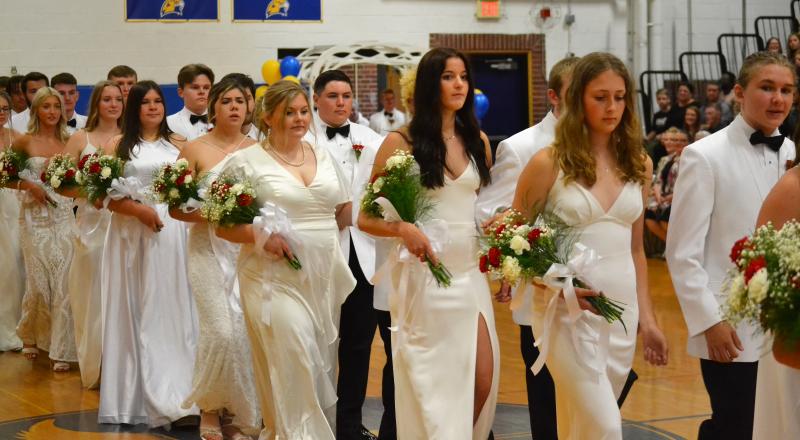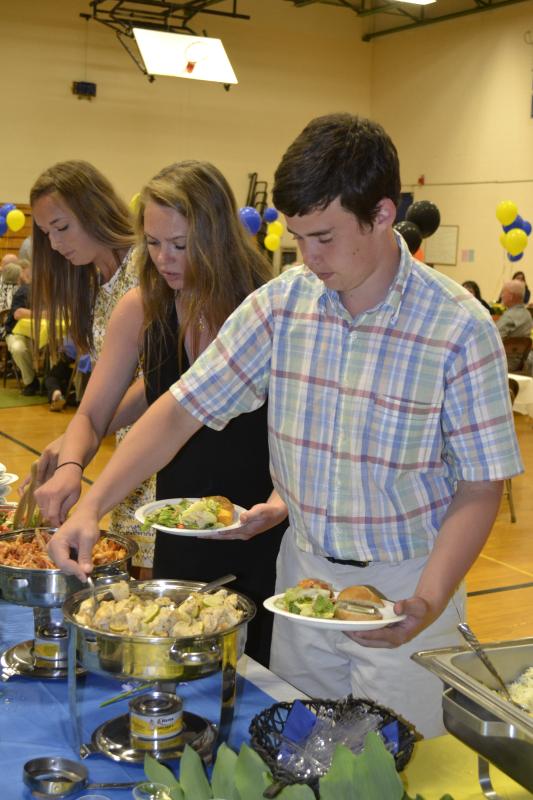The growing costs of graduation
 Having the Grand March inside, the Boothbay Region High School Alumni Association is able to recoup some costs associated with the longtime event. File photo
Having the Grand March inside, the Boothbay Region High School Alumni Association is able to recoup some costs associated with the longtime event. File photo
 Lynn Martin, president of the BRHS Alumni Association for the past 17 years, sees this year as a fundraising year for the association. File photo
Lynn Martin, president of the BRHS Alumni Association for the past 17 years, sees this year as a fundraising year for the association. File photo
 The Alumni Banquet is another fundraiser for the BRHS Alumni Association. File photo
The Alumni Banquet is another fundraiser for the BRHS Alumni Association. File photo
 Having the Grand March inside, the Boothbay Region High School Alumni Association is able to recoup some costs associated with the longtime event. File photo
Having the Grand March inside, the Boothbay Region High School Alumni Association is able to recoup some costs associated with the longtime event. File photo
 Lynn Martin, president of the BRHS Alumni Association for the past 17 years, sees this year as a fundraising year for the association. File photo
Lynn Martin, president of the BRHS Alumni Association for the past 17 years, sees this year as a fundraising year for the association. File photo
 The Alumni Banquet is another fundraiser for the BRHS Alumni Association. File photo
The Alumni Banquet is another fundraiser for the BRHS Alumni Association. File photo
In this second part of our series, Boothbay Register will explore Grand March, alumni banquet, graduation and other Grad Week events. We start with Grand March.
It is a celebrated tradition here for over 120 years. Seniors in white gowns and tuxedos march through the gym or, in recent years, across Sherman Field. The event is sponsored by Boothbay Region High School Alumni Association (BRHSAA). Lynn Martin, 17-year BRHSAA president, said the event is “magical, powerful, quaint and personal” and symbolizes the “transition from students to adulthood.”
The march has traditionally taken place in the gym with an admission fee. When the march moved outdoors for COVID, BRHSAA lost the ability to charge admission because it is hard to funnel attendees through a central point to collect the fee. Martin added, “Outside the music gets lost and it’s harder to decorate.”
When the event was held in the gym, Boothbay Region Greenhouses loaned potted plants and flower arrangements, and local businesses chipped in to pay for hundreds of balloons that covered the ceiling. BRHSAA has not been able to recreate the same atmosphere on the football field, Martin said. She prefers the event be held in the gym for these reasons.
Martin also said, since COVID, seniors have been given the choice of location and the class of 2022 chose Sherman Field. Rain moved the event to the gym.
Some years, BRHSAA raises money to sponsor the event, but not all years. Sometimes, the association has enough in reserves that additional fundraising is not needed. But with the loss of admission fee revenue, 2023 will be a fundraising year for the association, Martin said. Students also need to pay for their own gowns and tuxedos, which can be costly.
Last year, $3,390 was raised with donations from Boothbay Harbor Rotary Club, Lions Club and Bayview and Seaside Masonic Lodges to help offset student costs associated with the event. The offsets helped lower the cost of tuxedos from $250 to $100 and pay for dry cleaning of gowns passed on from prior classes.
“We are very appreciative of the civic groups that contribute money to help offset the cost for the students and Grand March. The rental cost for tuxedos has increased dramatically and these contributions help keep the cost of Grand March down. We also have had many dresses donated that students are able to help themselves to as opposed to having to buy a dress,” wrote BRHS Dean of Students Allan Crocker.
In searching for other schools that participate in Grand March, Boothbay Register found very few. Those found were in South America and Central Europe. Online searches showed schools in the U.S. and Canada have largely stopped the tradition out of concern for cultural differences and drawing attention to income disparity; parts of the event that include senior girls dancing with their fathers and senior boys dancing with their mothers could exclude single and same-gender parents, and the march could exclude LGBTQ students by use of traditional gender roles.
BRHSAA also hosts a banquet for graduating seniors. Routinely, the banquet is a private, catered event, free for students with tickets sold to parents and their guests. The revenue from Grand March is used to offset the costs of the banquet.
Seniors choose the banquet’s format. Some years, there was no banquet, one year it was a luncheon, last year it was a barbecue picnic held in conjunction with the Masonic Lodge, each group supplying about $700 to cover the cost of the event, which was free to students and their parents. Both the luncheon and the barbecue picnic were poorly attended, with “not much interest in either,” Martin said.
“Kids are different and given options – we try to remain flexible to meet them where they’re at. We never know how many will come and it’s hard to plan for, she said. The barbecue picnic will be repeated this year.
In addition to Project Graduation, Grand March and the alumni banquet, there are many more events, honors, meals and happenings for graduates. Among the activities are awards night, Senior Sunrise Breakfast, class day, a Rotary Club-hosted barbecue, a car parade, and town banners of seniors. Between labor and money, or both, it all can leave a wake of burned-out parents and students, said Lynn Blake, parent of graduating senior Sydney Blake.
Boothbay Register found that some people think Grad Week should be scaled down; some think rallying to get it all done is best; some think a la carte opt-in/opt-out is fine; and others think participation should be required uniformly. Some interviewed said let the seniors decide, others said upholding tradition is most important. “We were not given an option,” said Martin, relaying her own senior year experience. “Traditions stood, it was expected of us, and we looked forward to it. Last five or six years, they’re given a checklist.”
As for the graduation ceremony, it is typically paid for through fundraising during the students' four years of high school. A traditional graduation can be done for around $5,000 and it becomes more expensive the bigger it becomes. While the (school) budget does not generally pay for graduation, there are funds available if needed, but the classes have always been able to meet their fundraising goals,” wrote Crocker.
Within the $5,000 traditional graduation, items like decorations, caps, gowns, and diploma covers are included. “If a class wants to have a traditional graduation in the gym, it can happen with the class only having to raise $1,250 per year, which mostly is covered from the profits of the prom junior year. When you add on the cost of tents, banners, chairs, etc. (for an outdoor graduation) is when the final number goes up,” he explained.
“If we were to scale back some of the ‘extras,’ we could scale back the cost of graduation. We let the classes decide what they want to do and what they don't want year to year. The car parade will continue as long as it is something that the senior class wants to continue to do. There is no cost,” Crocker wrote.
Sentiment among parents interviewed is that a basic graduation ceremony should be paid for by the school, in part to relieve some of the fundraising burden on parents and the community and in part because it is a school-sanctioned event.
School Board Chair Peggy Splaine wrote, “We base our budget approval from the requests made by Allan Crocker, Dean of Students.”
In part one of this series, we reported that senior classes need to raise $25,000-$35,000 to cover the costs of Grad Week activities, with Project Graduation making up around $25,000 of that.
At the heart of this action-packed Grad Week is a group of teenagers who want to memorialize their time together and a community that wants to help them celebrate, said Boothbay Harbor Rotary Club President Bruce Harris. “The high school is central to the community and a place we all come together.”

























